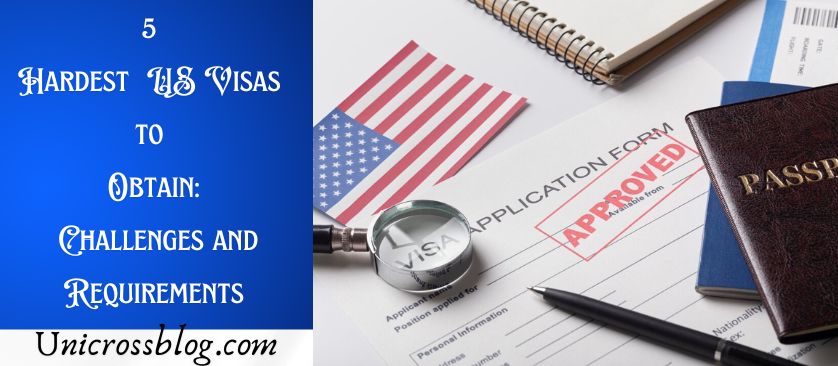Navigating the complex landscape of U.S. immigration can be a challenging task, particularly when it involves securing specific visas. As you begin your journey to obtain a U.S. visa, you may discover that some visas are notoriously difficult to acquire.
Understanding the challenges and requirements associated with these visas is crucial for managing your expectations and increasing your chances of success.
In this article, we will examine the five most challenging U.S. visas to obtain. We will discuss the complex processes, strict criteria, and potential obstacles you may face during the application journey. By understanding these challenges, you can better prepare for what lies ahead and make informed decisions about your immigration goals.

5 Hardest US Visas to Obtain: Challenges and Requirements
Securing a visa to enter the United States can be a complex and demanding process. Some visas, however, present particularly formidable challenges due to stringent eligibility criteria, extensive documentation requirements, and limited availability. Let’s explore the five most difficult US visas to obtain, and the hurdles applicants must overcome.
1. EB-1 Visa: Extraordinary Ability
The EB-1 visa, often referred to as the “Einstein Visa,” is reserved for individuals with extraordinary abilities in sciences, arts, education, business, or athletics. This first-preference employment-based immigrant visa is notoriously challenging to secure due to its high standards.
Applicants must demonstrate sustained national or international acclaim and recognition in their field. This typically involves providing evidence of major awards (such as Nobel Prizes or Olympic medals), membership in prestigious professional associations, or significant contributions to their industry. The bar is set exceptionally high, making the EB-1 visa one of the most elusive to obtain.
2. O-1 Visa: Individuals with Extraordinary Ability or Achievement
Similar to the EB-1, the O-1 visa is designed for individuals with extraordinary ability or achievement in sciences, arts, education, business, or athletics. However, it’s a nonimmigrant visa, meaning it’s temporary rather than a path to permanent residency.
To qualify, applicants must prove they are among the top few percent in their field globally. This involves presenting extensive documentation, including evidence of national or international awards, published material about the applicant’s work, and testimonials from experts in the field. The high threshold for “extraordinary ability” makes the O-1 visa a significant challenge for most professionals.
3. E-2 Visa: Treaty Investor
The E-2 visa allows individuals from countries with which the US maintains a treaty of commerce and navigation to invest a substantial amount of capital in a US business. While it might seem straightforward, the E-2 visa presents several hurdles:
- The investment must be “substantial,” a term that’s not precisely defined but generally means enough to ensure the successful operation of the enterprise.
- The business must be “real and operating,” not just existing on paper.
- The investor must be in a position to “develop and direct” the enterprise.
- The investment cannot be marginal, meaning it must have the capacity to generate more than enough income to provide a minimal living for the investor and family.
These requirements, combined with the need for detailed business plans and financial projections, make the E-2 visa a complex undertaking.
4. H-1B Visa: Specialty Occupations
The H-1B visa, while popular, is one of the most challenging to obtain due to its annual cap and lottery system. It’s designed for foreign workers in specialty occupations that require theoretical or technical expertise in specialized fields.
Key challenges include:
- Limited availability: Only 65,000 visas are available each fiscal year, with an additional 20,000 for individuals with US master’s degrees or higher.
- Lottery system: Due to high demand, USCIS uses a random selection process, meaning even qualified applicants may not be selected.
- Stringent requirements: Applicants must have at least a bachelor’s degree or its equivalent and the job must meet specific criteria to qualify as a specialty occupation.
The combination of limited availability and strict eligibility criteria makes the H-1B one of the most difficult visas to secure.
5. EB-5 Visa: Immigrant Investor
The EB-5 visa program offers a path to permanent residency for foreign investors willing to make a significant investment in a US business that creates jobs. However, it comes with substantial challenges:
- High investment threshold: Applicants must invest either $1.8 million in a general business or $900,000 in a targeted employment area.
- Job creation requirement: The investment must create or preserve at least 10 full-time jobs for qualifying US workers within two years.
- Complex documentation: Applicants must provide extensive evidence of the source of investment funds, business plans, and economic impact analyses.
- Lengthy processing times: Due to high demand and thorough vetting, processing can take several years.
The substantial financial commitment and rigorous requirements make the EB-5 visa one of the most challenging to obtain despite its appeal as a direct route to permanent residency.
READ ALSO: Best US Visa Options for Students: A Ranked List
FAQs
What makes these visas the hardest to obtain?
The visas discussed in this article are considered the hardest to obtain due to a combination of factors. These include stringent eligibility requirements, extensive documentation, lengthy processing times, and limited quota availability. For instance, the EB-1 visa for extraordinary ability requires applicants to demonstrate exceptional achievements in their field, while the O-1 visa demands proof of sustained national or international acclaim. The complexity of these requirements often necessitates professional legal assistance, adding to the challenge and cost of the application process.
How long does it typically take to process these visas?
Processing times for these visas can vary significantly depending on the specific visa category, the applicant’s circumstances, and the current workload of U.S. Citizenship and Immigration Services (USCIS). Generally, the more complex the visa category, the longer the processing time. For example, EB-5 investor visas can take anywhere from 18 to 24 months or even longer. E-2 treaty investor visas may be processed more quickly, often within 2-4 months, but this can vary based on the U.S. embassy or consulate handling the application. It’s important to note that these timeframes are estimates and can change due to various factors, including government policies and application volumes.
Can I expedite the process for any of these visas?
While expedited processing is not available for all visa categories, some do offer premium processing options. For instance, the O-1 visa for individuals with extraordinary ability offers a premium processing service for an additional fee. This service guarantees a response from USCIS within 15 calendar days. However, it’s crucial to understand that premium processing only expedites the initial review of your petition, not the final decision. Additionally, for visas like the EB-5 investor visa, where thorough background checks and complex financial reviews are required, expedited processing is generally not available due to the nature of the application.
What happens if my visa application is denied?
If your visa application is denied, the next steps depend on the reason for denial and the specific visa category. In some cases, you may be able to appeal the decision or file a motion to reopen or reconsider. However, these processes can be complex and time-consuming. Alternatively, you might choose to reapply, addressing the reasons for the initial denial. It’s important to carefully review the denial notice, which should explain the specific grounds for rejection. Consulting with an experienced immigration attorney can be invaluable in determining the best course of action, whether it’s appealing, reapplying, or considering alternative visa options.
Are there any alternatives to these hard-to-obtain visas?
Yes, depending on your specific circumstances, there may be alternative visa options to consider. For example, if you’re unable to qualify for the O-1 visa for extraordinary ability, you might explore the H-1B visa for specialty occupations. If the EB-5 investor visa seems out of reach, the E-2 treaty investor visa might be a viable alternative for certain nationalities. Similarly, those not qualifying for the EB-1 extraordinary ability category might consider the EB-2 category for professionals with advanced degrees or exceptional ability. It’s crucial to thoroughly assess your qualifications, career goals, and personal circumstances to identify the most suitable visa option. Consulting with an immigration attorney can provide valuable insights into alternative pathways that align with your specific situation and long-term objectives in the United States.







